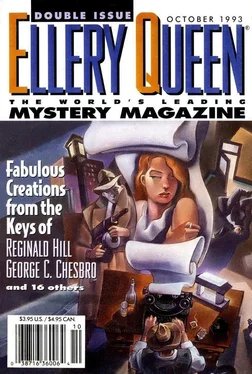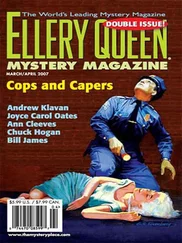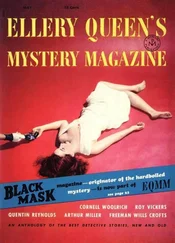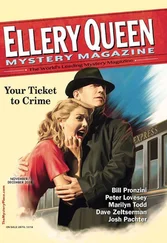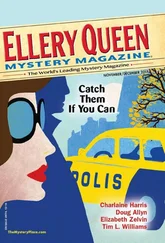Charles Ardai - Ellery Queen’s Mystery Magazine. Vol. 102, No. 4 & 5. Whole No. 618 & 619, October 1993
Здесь есть возможность читать онлайн «Charles Ardai - Ellery Queen’s Mystery Magazine. Vol. 102, No. 4 & 5. Whole No. 618 & 619, October 1993» весь текст электронной книги совершенно бесплатно (целиком полную версию без сокращений). В некоторых случаях можно слушать аудио, скачать через торрент в формате fb2 и присутствует краткое содержание. Город: New York, Год выпуска: 1993, Издательство: Davis Publications, Жанр: Детектив, на английском языке. Описание произведения, (предисловие) а так же отзывы посетителей доступны на портале библиотеки ЛибКат.
- Название:Ellery Queen’s Mystery Magazine. Vol. 102, No. 4 & 5. Whole No. 618 & 619, October 1993
- Автор:
- Издательство:Davis Publications
- Жанр:
- Год:1993
- Город:New York
- ISBN:нет данных
- Рейтинг книги:3 / 5. Голосов: 1
-
Избранное:Добавить в избранное
- Отзывы:
-
Ваша оценка:
- 60
- 1
- 2
- 3
- 4
- 5
Ellery Queen’s Mystery Magazine. Vol. 102, No. 4 & 5. Whole No. 618 & 619, October 1993: краткое содержание, описание и аннотация
Предлагаем к чтению аннотацию, описание, краткое содержание или предисловие (зависит от того, что написал сам автор книги «Ellery Queen’s Mystery Magazine. Vol. 102, No. 4 & 5. Whole No. 618 & 619, October 1993»). Если вы не нашли необходимую информацию о книге — напишите в комментариях, мы постараемся отыскать её.
Ellery Queen’s Mystery Magazine. Vol. 102, No. 4 & 5. Whole No. 618 & 619, October 1993 — читать онлайн бесплатно полную книгу (весь текст) целиком
Ниже представлен текст книги, разбитый по страницам. Система сохранения места последней прочитанной страницы, позволяет с удобством читать онлайн бесплатно книгу «Ellery Queen’s Mystery Magazine. Vol. 102, No. 4 & 5. Whole No. 618 & 619, October 1993», без необходимости каждый раз заново искать на чём Вы остановились. Поставьте закладку, и сможете в любой момент перейти на страницу, на которой закончили чтение.
Интервал:
Закладка:
When we reached her house, she said,
“Richard, you are an angel. Please drop John’s wet things in the butler’s pantry. I am going to take him upstairs to bed. He is having a chill. I’ll never be able to thank you enough. Your afterschool surprise is on the hall table, an almond chocolate bar. Come over and see John later.”
But that evening just before my nursery supper when I went to show John the developed prints of the Mauretania and Buckingham Palace, his father met me in the living room and said that John was ill — his chill had gone worse. His mother was upstairs with him, and I must not go up.
“Well, Richard,” said Howard Burley, “God only knows what they would have done to John if you hadn’t come to get his mother. They will catch it, never fear. I have talked to their fathers.”
I had been feeling all afternoon a mixture of guilt and fright for having snitched on the boys. Now I was sure they would avenge themselves on me. Something of this must have shown in my face.
“Never fear,” said Mr. Burley. “Their fathers will see to it that nothing happens to you. Come over and see John tomorrow.”
But the next day they said that John was really ill with grippe.
“Did they send for Dr. Grauer?” asked my mother.
“I don’t know,” I said.
He was our doctor, too, and we would have known his car if he had come to attend to John. But all day nobody came, and the next day, John was worse, and my mother said to my father, with glances that recalled my presence to him, which must require elliptical conversation,
“Grippe sometimes goes into pneumonia, you know.”
“Yes, I know,” replied my father. “But they know how to treat these things.”
“Yes, I know, but sometimes something is needed beyond just home remedies.”
“Then Grauer has not yet—?”
“No, not today, either.”
“That is odd. Perhaps he isn’t so sick as we think.”
“Oh, I think so. I talked to Gail today. She is frantic.”
“Well.”
“But she says she knows what to do. They are doing everything, she says. Everything possible.”
“I am sure they are. — Sometimes I can’t help thinking that it might be better all around if—”
“Yes, I have too,” said my mother hastily, indicating me again. “But of course it must only be God’s will.”
My father sighed.
I knew exactly what they were talking about, though they thought I didn’t.
On the third day, John Burley died. My mother told me the news when I reached home after school. She winked both eyes at me as she always did in extremes of feeling. She knelt down and enfolded me. Her lovely heart-shaped face was an image of pity. She knew I knew nothing of death, but some feeling of death came through to me from the intensity of color in her blue eyes. The power of her feeling upset me, and I swallowed as if I were sick when she said,
“Richard, my darling, our dear, poor, little John died this morning. His chill grew worse and worse and finally turned into pneumonia. They have already taken him away. His mother wanted me to tell you. She loves you for what you tried to do for him.”
“Then he’s gone?”
“Yes, my dearie, you will never be able to see him again. That is what death means.”
I was sobered by these remarks, but I did not weep. I was consumed with wonder, though I was not sure what I wondered about.
There was no funeral. Burial, as they said, was private. I missed John, but I was busy at school, where I was cautious with the Grandvilles and the others until enough days passed after the punishments they had received to assure me that I was safe from their reprisals. Perhaps they wanted to forget that they had given away death in heedless play. Howard Burley went to the office quite as usual. His wife stayed home and saw no one for a while.
“I cannot help wondering,” said my mother, “why she never called Dr. Grauer.”
“Hush,” said my father. “Don’t dwell on such things.”
But I dwelled on them now and then. They were part of my knowledge on the day when Gail Burley asked my mother to send me to see her after school.
“Mrs. Burley has some things of John’s that she wants to give you. You were his best friend.”
I knew all his toys. Some of them were glorious. I saw them all in my mind again. I went gladly to see his mother.
The housemaid let me in and sent me upstairs to Mrs. Burley’s sitting room. She was reclining against many lacy pillows on a chaise longue in the bay window. She was paler than ever, and perhaps thinner, and there was a new note in her voice which made her seem like a stranger — a huskiness which reflected lowered vitality. She embraced me and said,
“Do you miss John?”
“Yes.”
“Poor little John.”
Her hazel eyes were blurred for a moment and she looked away out the window into the rustling treetops of autumn, as though to conceal both emotion and knowledge from me. “Oh, my God,” I heard her say softly. Then she let forth one of her controlled breaths, annoyed at her own weakness as it lay embedded in the general condition of the world, and said with revived strength,
“Well, Richard, let’s be sensible. Come and pick out the toys you want in John’s nursery. What you don’t take I am going to send to Father Raker’s orphanage.”
She led me along the upstairs hall to John’s room. His toys were laid out in rows, some on the window seat, the rest on the floor.
“I suppose I could say that you should just take them all,” she said with one of her unwilling smiles, “but I think that would be selfish of us both. Go ahead and pick.”
With the swift judgment of the expert, I chose a beautiful set of Pullman cars for my electric train, which had the same track as John’s, and a power boat with mahogany cabin and real glass portholes draped in green velvet curtains, and a battalion of lead soldiers with red coats and black busbies and white cross belts tumbled together in their box who could be set smartly on parade, and a set of watercolor paints, and a blackboard on its own easel with a box of colored chalks. These, and so much else in the room, spoke of attempts to reward John for what he was not — and for what they were not, the parents, too. I looked up at his mother. She was watching me as if never to let me go.
“Your cheeks are so flushed,” she said, “and it is adorable the way the light makes a gold ring on your hair when you bend down. Richard, come here.”
She took me in her hungry arms. I felt how she trembled. There was much to make her tremble.
“Do you want anything else?” she asked, again becoming sensible, as she would have said. Her concealed intensity made me lose mine.
“No, thank you, Mrs. Burley.”
“Well, you can take your new toys home whenever you like. You can’t carry them all at once.”
“I’ll take the boat now,” I said.
“All right. Garsh, it’s big, isn’t it. John loved to sail it when we went to Narragansett.”
She took me downstairs to the door. There she lingered. She wanted to say something. She could have said it to an adult. How could she say it to me? Yet most grown people spoke to me as if I were far older than my years. Leaning her back against the door, with her hands behind her on the doorknob and with her face turned upward so that I saw her classical white throat and the curve of her cheek until it was lost in the golden shadows of her eye, she said,
“Richard, I wonder if you would ever understand — you knew, didn’t you, surely, that our poor little John was not like other children?”
“Sometimes, yes.”
“His father and I suffered for him, seeing how hard it was for him with the other children; and then we thought of how it would have to be when he grew up — do you know?”
Читать дальшеИнтервал:
Закладка:
Похожие книги на «Ellery Queen’s Mystery Magazine. Vol. 102, No. 4 & 5. Whole No. 618 & 619, October 1993»
Представляем Вашему вниманию похожие книги на «Ellery Queen’s Mystery Magazine. Vol. 102, No. 4 & 5. Whole No. 618 & 619, October 1993» списком для выбора. Мы отобрали схожую по названию и смыслу литературу в надежде предоставить читателям больше вариантов отыскать новые, интересные, ещё непрочитанные произведения.
Обсуждение, отзывы о книге «Ellery Queen’s Mystery Magazine. Vol. 102, No. 4 & 5. Whole No. 618 & 619, October 1993» и просто собственные мнения читателей. Оставьте ваши комментарии, напишите, что Вы думаете о произведении, его смысле или главных героях. Укажите что конкретно понравилось, а что нет, и почему Вы так считаете.
